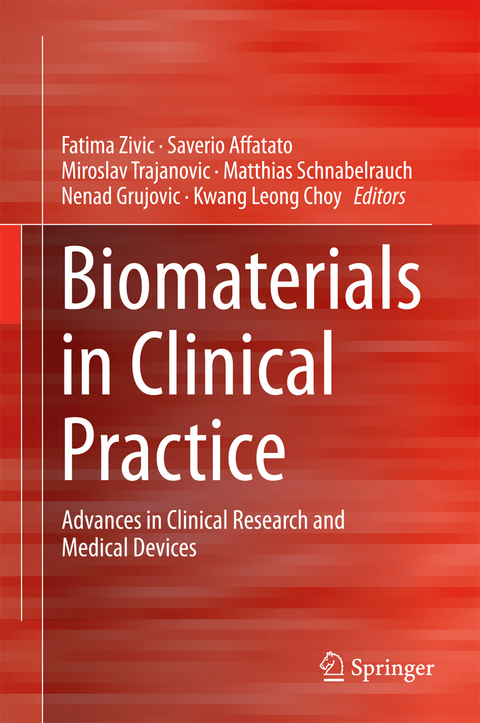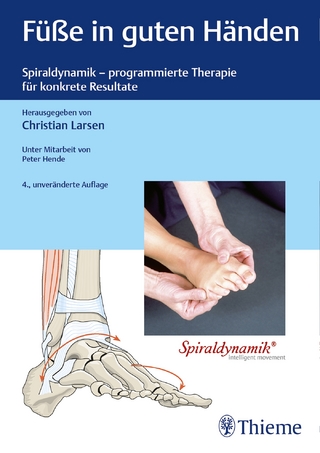
Biomaterials in Clinical Practice
Springer International Publishing (Verlag)
978-3-319-68024-8 (ISBN)
The book then reviews general types of biomaterials - polymers, ceramics, and metals, as well as different material structures such as porous materials and coatings and their applications - before exploring various current research trends, such as biodegradable and porous metals, shape memory alloys, bioactive biomaterials and coatings, and nanometals used in the diagnosis and therapy of cancer.
In turn, the book discusses a range of methods and approaches used in connection with biomaterial properties and characterization - chemical properties, biocompatibility, in vivo behaviour characterisation, as well as genotoxicity and mutagenicity - and reviews various diagnostic techniques: histopathological analysis, imagining techniques, and methods for physicochemical and spectroscopic characterization. Properties of stent deployment procedures in cardiovascular surgeries, from aspects of prediction, development and deployment of stent geometries are presented on the basis of novel modelling approaches.
The last part of the book presents the clinical applications of biomaterials, together with case studies in dentistry, knee and hip prosthesis. Reflecting the efforts of a multidisciplinary team of authors, gathering chemical engineers, medical doctors, physicists and engineers, it presents a rich blend of perspectives on the application of biomaterials in clinical practice. The book will provide clinicians with an essential review of currently available solutions in specific medical areas, also incorporating non-medical solutions and standpoints, thus offering them a broader selection of materials and implantable solutions. This work is the result of joint efforts of various academic and research institutions participating in WIMB Tempus project, 543898-TEMPUS-1-2013-1-ES-TEMPUS-JPHES, "Development of Sustainable Interrelations between Education, Research and Innovation at WBC Universities in Nanotechnologies and Advanced Materials where Innovation Means Business", co-funded by the Tempus Programme of the European Union.
Fatima Zivic is an Assistant Professor at the Faculty of Engineering, University of Kragujevac, Serbia, where she teaches courses on: Biomaterials, Surface Modification Technologies, Metrology and Quality Control. Her research explores novel biomaterial structures and material characterisation (mechanical and structural properties). Saverio Affatato is a Medical Physicist at the Rizzoli Orthopaedic Institute (IOR) (www.ior.it/tecno). In addition, he is the Head of the "Wear Characterization of Joint Prostheses Research Unit" of the IOR's Medical Technology Laboratory.rial, sans-s Miroslav Trajanovic is a Full Professor at the Faculty of Mechanical Engineering, University of Nis, Serbia. He has more than 35 years of experience in the application of ICT in mechanical engineering and medicine and more than 250 published papers to his credit. He has broad expertise in the modeling of biomaterials' structural design (scaffold structures, bone grafts). In addition, he is the Serbian coordinator of the European EURAXESS services network. Matthias Schnabelrauch received his PhD in Polymer Chemistry from Friedrich-Schiller-University, Jena. After postdoctoral positions at the University of Zurich, ETH Zurich, and the Hans-Knöll-Institute, Jena, he currently heads the Biomaterials Department of INNOVENT e. V., Jena, Germany. His main research interests are in the synthesis, characterisation and application of degradable biomaterials. He is the author/co-author of more than 150 peer-reviewed scientific papers and 50 patent applications. Nenad Grujovic is a Full Professor and Head of the Center for Information Technologies (http://cit.fink.rs) at the Faculty of Engineering, University of Kragujevac, Serbia. His research focuses on custom-made medical implants, tissue engineering, 3D printing and FEM modeling. He has led two clinical projects on custom-made implants used iont of Ti-reinforced PMMA artificial ribs (in 2017) made using 3D printing. Kwang Leong Choy is a Professor of Materials Discovery at University College London and Director of the UCL Institute for Materials Discovery (http://www.ucl.ac.uk/institute-for-materials-discovery). She has authored over 220 peer-reviewed publications, including 3 books, and holds 20 patents on nanomaterials, thin films and coatings for structural, functional and biomedical applications.
Chapter 1. Short History of Biomaterials Used in Hip Arthroplasty and their Modern Evolution.- Part 1: Material Classes.- Chapter 2. Progress Beyond the State-of-the-art in the Field of Metallic Materials for Bioimplant Applications.- Chapter 4. Polymeric Biomaterials in Clinical Practice.- Chapter 5. Polymeric Biomaterials Based on Polylactide, Chitosan and Hydrogels in Medicine.- Chapter 6. Polyethylene Based Polymer for Joint Replacement.- Chapter 7. Ceramics for Hip Joint Replacement.- Chapter 8. Metallic Biomaterials.- Chapter 9. Biodegradable Metals as Biomaterials for Clinical Practice: Iron-based Materials.- Chapter 10. Porous Metals in Orthopaedics.- Chapter 11. Properties and Behavior of Shape Memory Alloys in the Scope of Biomedical and Engineering Applications.- Chapter 12. Bioactive Biomaterials: Potential for Application in Bone Regenerative Medicine.- Chapter 13. Bioactive Coatings.- Chapter 14. Nanometals in Cancer Diagnosis and Therapy.- Part 2: Biomaterial Propertiesand Characterization.- Chapter 15. Chemical Bulk Properties of Biomaterials.- Chapter 16. Assessment of Metallic Alloys Biocompatibility.- Chapter 17. Determining the Biological Properties of Biomaterials In Vivo.- Chapter 18. Genotoxicity and Mutagenicity Testing of Biomaterials.- Chapter 19. Histopathological Analysis of Bone Tissue Reaction on Implanted Biomaterials.- Chapter 20. Imaging in Clinical and Preclinical Practice.- Chapter 21. Selected Instrumental Methods for Physicochemical and Spectroscopic Characterization of Different Biomaterials.- Chapter 22. An Overview of In Vitro Mechanical and Structural Characterization of Hip Prosthesis Components.- Chapter 23. Characterization of Mechanical Properties of Metal Biomaterials.- Chapter 24. Manufacturability of Biomaterials.- Chapter 25. Computer Modeling of Stent Deployment in the Coronary Artery Coupled with Plaque Progression.- Part 3: Clinical Applications.- Chapter 26. Biomaterials in Dentistry - Implantology and Guided Bone Regeneration.- Chapter 27. Knee Arthroplasties.- Chapter 28. Total Endoprothesis of Hip Joint: Characteristics and Application in Patients in the Central Region of Serbia.
| Erscheinungsdatum | 14.11.2017 |
|---|---|
| Zusatzinfo | XV, 830 p. 297 illus., 194 illus. in color. |
| Verlagsort | Cham |
| Sprache | englisch |
| Maße | 155 x 235 mm |
| Gewicht | 1528 g |
| Themenwelt | Medizin / Pharmazie ► Pflege |
| Medizin / Pharmazie ► Physiotherapie / Ergotherapie ► Orthopädie | |
| Technik ► Maschinenbau | |
| Technik ► Umwelttechnik / Biotechnologie | |
| Schlagworte | Bioactive Coatings • biochemical engineering • biomaterials • Biomaterials for Clinical Applications • biomedical engineering • Bioresorbable Iron and Magnesium • Biotechnology • Engineering • Engineering: general • Joint Replacements • Materials Science • Porous Metals and Nanometals • Rehabilitation • Rehabilitation Medicine • rehabilitation psychology • WIMB Project |
| ISBN-10 | 3-319-68024-2 / 3319680242 |
| ISBN-13 | 978-3-319-68024-8 / 9783319680248 |
| Zustand | Neuware |
| Haben Sie eine Frage zum Produkt? |
aus dem Bereich


